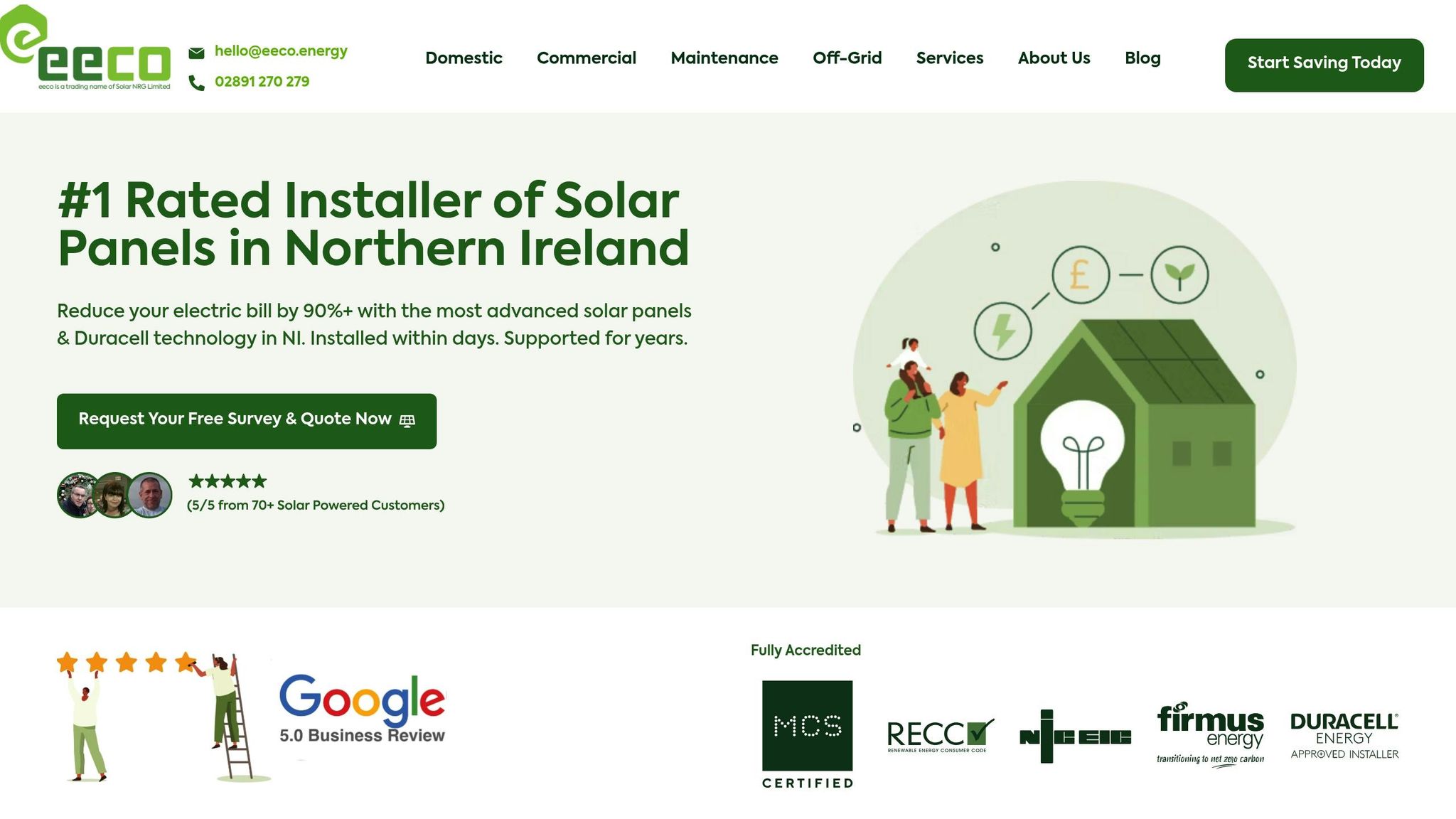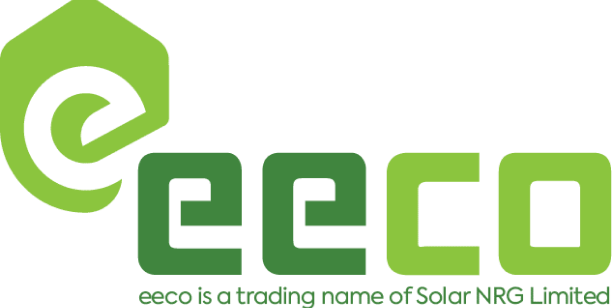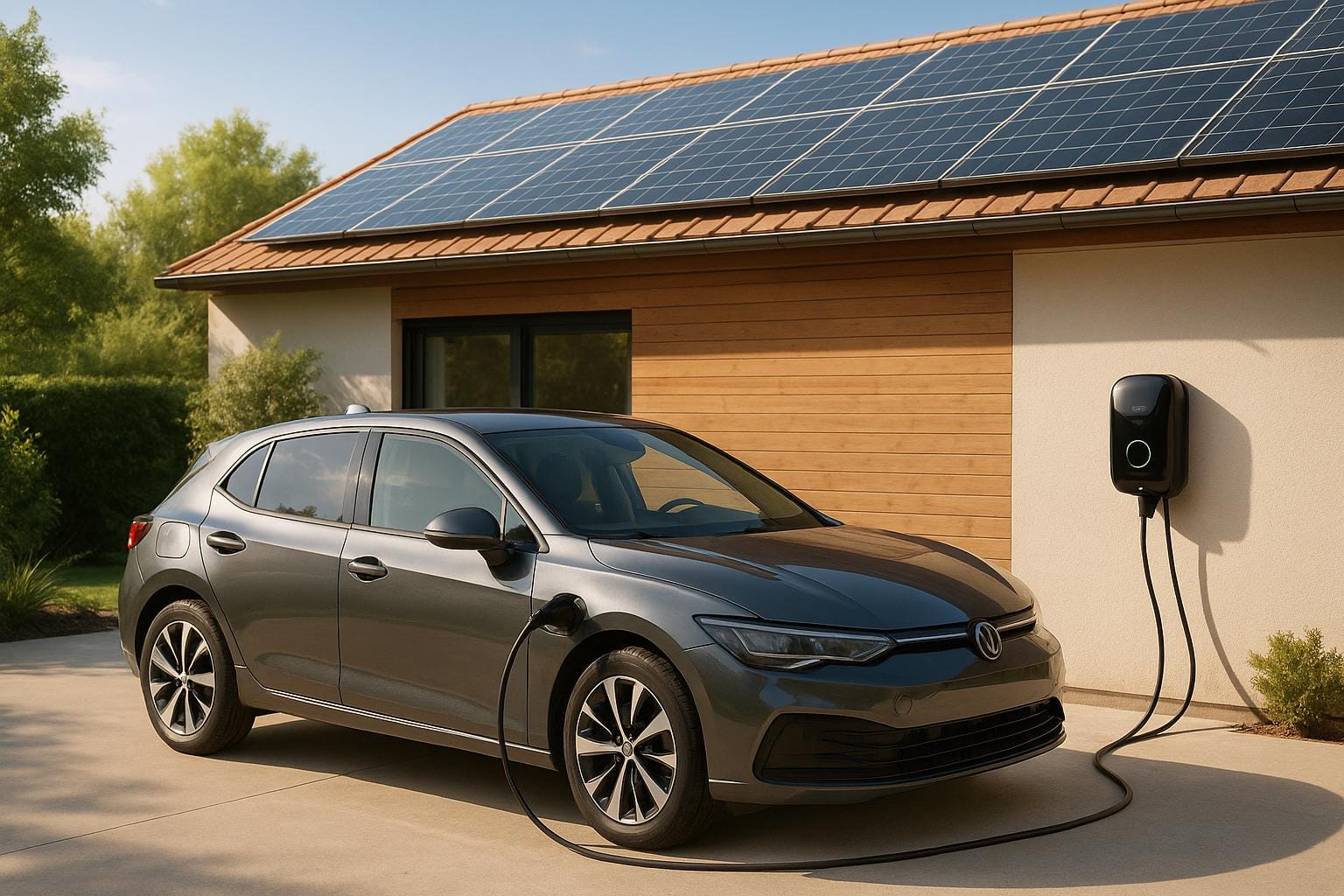Smart EV chargers paired with solar panels let you charge your electric vehicle (EV) using renewable energy, cutting electricity costs and reducing reliance on the grid. These systems optimise charging schedules based on solar production, energy demand, and weather, ensuring efficient use of solar power. Here’s what you need to know:
- Cost Savings: Use free solar energy to charge your EV, reducing energy bills. Smart chargers also schedule charging during off-peak grid hours for added savings.
- Energy Independence: Generate and use your own power, with battery storage options for night-time or cloudy-day use.
- Lower Emissions: Charging with solar energy eliminates emissions tied to grid electricity, supporting cleaner energy use.
- Key Features: Includes real-time monitoring, dynamic load balancing, and charging modes like eco (solar-only) or fast (solar + grid).
In Northern Ireland, these systems align with renewable goals and are supported by incentives like the Smart Export Guarantee (SEG), which pays for surplus solar energy fed back to the grid. Upfront costs vary but can provide long-term savings and energy security. EECO Energy offers tailored solutions, ensuring installations meet local regulations and maximise efficiency.
How Smart EV Chargers Work with Solar Panels
Let’s dive deeper into how smart EV chargers work alongside solar panels to make the most of solar energy. These systems are designed to coordinate various components, ensuring energy is used efficiently across your home and your electric vehicle (EV).
System Components and Setup
A smart EV charging system connected to solar panels includes several essential components that work together. Solar photovoltaic (PV) panels capture sunlight and convert it into direct current (DC) electricity. This is then transformed into alternating current (AC) by an inverter, making it suitable for household use and EV charging.
The smart charger links to your home’s network via Wi‑Fi, allowing it to sync with your solar system and monitor energy consumption in real time using current transformers (CTs). Some setups also feature battery storage, which can hold surplus solar energy for later use, such as charging your EV at night or during cloudy weather. The entire system is managed by energy management software, which decides how to distribute power – whether to your EV, household appliances, or storage – based on solar energy production, household needs, and your personal charging preferences.
EECO Energy ensures these systems are installed as a cohesive solution, where all components communicate effectively. Installation involves connecting the smart charger to your home’s electrical system and programming the software to recognise your solar panels and typical energy usage patterns. This integration makes solar-powered EV charging a smooth and efficient process.
Using Solar Energy for EV Charging
Smart chargers are designed to take advantage of peak solar production hours, usually between 10:00 and 16:00 when sunlight is strongest. By constantly monitoring solar output and household energy use, the system ensures any excess solar energy is directed to your EV for charging.
This is achieved through dynamic load balancing. For example, if your solar panels are producing more electricity than your home is using, the smart charger automatically redirects the surplus to your EV. If household energy demand increases, the system adjusts, reducing the power sent to the charger.
The system also factors in weather forecasts and your charging schedule. For instance, if your EV needs to be fully charged by 07:00 the next day but the forecast predicts limited sunshine, the charger will supplement solar energy with grid electricity during off-peak hours when rates are lower.
Many smart chargers come with different charging modes to suit your needs:
- Eco mode relies solely on solar energy, which may mean slower charging on cloudy days.
- Fast mode combines solar power with grid electricity to speed up charging.
- Scheduled mode lets you set specific charging times, regardless of solar availability.
Monitoring and Automatic Controls
Real-time monitoring tools give you a clear picture of how your energy is being used. Through smartphone apps or web portals, you can track how much solar energy is powering your EV, how much electricity comes from the grid, and the savings compared to traditional grid charging.
The system also uses automatic controls to adjust charging rates in response to changing conditions. For example, if cloud cover reduces your solar output from 4 kW to 2 kW, the charger will immediately lower the charging power to match the new energy availability. When the sun comes back out and solar output increases, the charger ramps up charging power again.
Smart scheduling ensures your EV is charged during the best solar hours, aligning with your daily routine, so it’s ready when you need it. Load management features prevent your home’s electrical system from being overwhelmed, potentially saving you from expensive electrical upgrades.
Some advanced systems even predict the best charging times by analysing past solar production data, weather forecasts, and your driving habits. This predictive approach helps maximise the use of renewable energy while ensuring your EV is always ready for the road.
Key Benefits of Pairing Smart EV Chargers with Solar Panels
Combining smart EV chargers with solar panels is a smart move for households in Northern Ireland. It not only trims down energy costs but also increases energy independence. These advantages are built on the system’s efficient design and automated controls.
Lower Energy Bills
One of the standout perks of solar-powered EV charging is tapping into renewable energy produced right on your roof. When the sun is shining, your EV can run on free, locally generated power instead of expensive electricity from the grid. Smart chargers take this a step further by scheduling charging sessions during times of peak solar output or when electricity rates are lower. Even on overcast days, the system adapts to use the most cost-effective energy source available.
Greater Energy Independence
Generating and using your own solar energy gives you more control over your energy needs. Solar panels deliver their best output during the day – often when cars are parked at home. By pairing these panels with a smart charging system, you can rely on self-generated power to charge your EV. If there’s surplus solar power, a connected battery can store it for use later, such as charging your car after dark. This setup not only shields you from energy price spikes but also reduces reliance on an unstable grid.
Reduced Carbon Emissions
Charging your EV with 100% renewable solar energy significantly reduces the indirect emissions tied to grid electricity. While EVs produce no emissions during use, the environmental impact of charging depends on the energy source. By switching to solar power, which is clean by nature, you cut out the emissions linked to fossil-fuel-generated electricity. Plus, solar panels are designed to generate renewable energy for decades, offering long-term environmental benefits after a short energy payback period. This approach aligns with broader goals to decarbonise both home energy use and transportation, making it a win for sustainability.
Installation Considerations for Northern Ireland
If you’re in Northern Ireland and considering smart EV chargers combined with solar panels, it’s essential to evaluate your property’s roof space and parking area beforehand.
Installation Requirements and Process
To get the most out of solar panels, your roof should ideally face south and receive unobstructed sunlight throughout the day. Additionally, your property must have off-street parking within a reasonable distance of your electrical supply. This ensures the charging cable is protected from potential weather damage.
Your home’s electrical system also needs to be robust enough to support the extra load from both solar panels and EV charging equipment. An electrical survey will confirm whether your consumer unit and supply are up to the task. For older properties, upgrades to the electrical system may be necessary.
The installation process is methodical and staged. It begins with setting up the solar panels, followed by inverters and monitoring systems, and finally, the EV charger. Approval from your electricity supplier is required to complete the setup. These steps ensure a seamless transition while aligning with local regulations and incentives.
Grants, Incentives, and Regulations
In Northern Ireland, the Smart Export Guarantee (SEG) allows you to earn between 3p and 7p per kWh for surplus solar electricity fed back into the grid.
For properties in conservation areas, check with your local council to ensure compliance with any specific requirements. EV charger installations must meet Building Regulations Part P and adhere to the IET Wiring Regulations (BS 7671). Only certified electricians should carry out the work.
To qualify for SEG payments and preserve warranty coverage, installations must be accredited by the Microgeneration Certification Scheme (MCS). With these incentives in mind, EECO Energy simplifies the process, offering local expertise and ensuring compliance.
EECO Energy‘s Energy Solutions

By opting for professional installations, homeowners can enjoy reduced energy costs and greater energy independence. EECO Energy, an experienced MCS-accredited installer, ensures all installations meet regulatory standards while helping clients maximise available incentives.
EECO Energy offers solar systems ranging from 4.5kW at £3,950 to 9kW at £5,900, with battery storage options priced between £2,400 and £3,650. They provide free site surveys, installations completed in a single day, and 25-year warranties, ensuring long-term value.
As an approved Duracell installer, EECO Energy also offers extended warranty options and technical support for high-quality battery systems. Their services include EV charging stations, smart immersion controllers, and ongoing maintenance. By choosing EECO Energy, households can achieve meaningful energy savings and take a step closer to energy independence.
sbb-itb-d2d975a
Smart EV Charging With and Without Solar Panels
Choosing between standalone smart EV chargers and solar-integrated systems can feel like a big decision, but understanding how they work can help you make informed energy choices. Both options bring their own perks, but combining smart chargers with solar panels often leads to greater savings and a more sustainable energy setup.
Standalone smart EV chargers are designed to optimise your charging schedule, especially by making use of off-peak electricity rates. While this can reduce costs, relying solely on grid electricity means you’re still tied to fluctuating energy prices. The smart features ensure efficient charging, but the source of your energy remains unchanged.
On the other hand, pairing a smart EV charger with solar panels creates a more holistic energy solution. Solar panels produce electricity during the day, and your smart charger can prioritise using this renewable energy to power your electric vehicle. In ideal conditions, a well-sized solar system can meet a significant portion of your EV’s charging needs, leading to noticeable savings compared to grid electricity – even when off-peak rates are applied.
Benefits Comparison Table
Here’s a quick look at how the two systems stack up:
| Feature/Benefit | Smart EV Charging Only | Smart EV Charging + Solar Panels |
|---|---|---|
| Energy Cost Savings | Moderate savings with off-peak charging | Greater savings with renewable solar energy |
| Carbon Footprint | Lower than traditional charging | Minimal, thanks to renewable energy use |
| Energy Independence | Relies on grid electricity | Higher independence with self-generated power |
| Upfront Investment | Lower initial cost | Higher upfront cost for installation |
| Long-Term Value | Moderate benefits over time | Significant returns over the system’s lifetime |
| Grid Export Income | Not available | Possible income from surplus energy exports |
As the table highlights, solar integration offers greater energy independence and long-term value. This aligns perfectly with Northern Ireland’s renewable energy ambitions. While it’s true that solar-integrated systems come with a higher upfront cost, the long-term savings and environmental benefits often make the investment worthwhile. EECO Energy provides customised solar energy solutions to help customers in Northern Ireland cut down on energy costs and take a step towards energy independence.
Of course, weather plays a role. Standalone chargers provide a consistent supply from the grid, while solar-integrated systems may need grid backup during extended cloudy periods. However, Northern Ireland gets enough daylight throughout the year to make solar panels a practical and effective addition.
Standalone chargers typically offer basic data tracking, like charging times and energy usage. In contrast, solar-integrated systems give you a complete view of your energy ecosystem – covering everything from energy generation and consumption to EV charging and grid exports – through a single, easy-to-use interface. This added visibility helps you take full control of your energy usage and maximise your savings.
Achieving Energy Independence in Northern Ireland
Embracing energy independence in Northern Ireland offers more than just cost savings – it’s a step towards long-term energy security and control. By combining smart EV chargers with solar panels, you can create a self-sufficient energy system that shields you from rising energy costs while also lowering your carbon footprint.
Energy security takes centre stage, especially during grid outages or times of high demand. A solar-powered charging system reduces your reliance on external energy providers, ensuring a steady supply of clean energy for your transport needs. Add battery storage to the mix, and you’ll have access to power even during cloudy days or after sunset.
The environmental benefits are equally compelling. By replacing traditional grid electricity with renewable solar energy for your EV, you directly cut down on carbon emissions, contributing to a cleaner, greener future.
To unlock these benefits, partnering with the right provider is key. EECO Energy stands out as a trusted name in Northern Ireland, offering integrated solar and EV charging solutions. Their services include detailed energy assessments, MCS-accredited installations, and 25-year warranties to safeguard your investment.
Their local expertise and technical know-how are crucial for designing systems that perform well in Northern Ireland’s unique climate. From ensuring optimal solar panel placement to managing electrical connections and adhering to local regulations, professional installation maximises system efficiency and your long-term returns.
Investing in solar-powered EV charging isn’t just about saving money – it’s a commitment to a sustainable and secure energy future. The technology works, the savings are tangible, and the environmental impact is a meaningful step towards a cleaner Northern Ireland.
FAQs
How do smart EV chargers work with solar panels to charge my vehicle efficiently?
Smart EV chargers pair effortlessly with solar panels, focusing on using the electricity generated by your solar system to charge your vehicle. They can be programmed to charge during times when your solar panels are producing the most energy, allowing you to maximise your renewable energy usage while cutting down on grid dependency.
These chargers also work alongside solar inverters to ensure energy is converted and transferred efficiently, making the most of the clean power your system generates. By integrating a smart EV charger with solar panels, you can save on energy costs, shrink your carbon footprint, and take a step closer to energy self-sufficiency.
What financial benefits and savings can you expect from installing smart EV chargers with solar panels in Northern Ireland?
Installing smart EV chargers alongside solar panels in Northern Ireland can lead to substantial savings. By using solar power to charge electric vehicles, homeowners can cut down on energy bills and reduce their dependence on the grid. Plus, there are financial incentives to ease the initial installation costs. For example, the NISEP scheme can cover about 20% of the expenses.
Across the UK, additional benefits include a 0% VAT rate on solar systems, which is set to last until at least 2027, and grants of up to £350 for installing EV chargers. When combined with the lower running costs of electric vehicles powered by solar energy, these incentives make it a smart move for those looking to save on energy costs and increase their energy independence.
Can I charge my electric vehicle with solar energy on cloudy days or at night?
Yes, you can use solar energy to charge your electric vehicle even on cloudy days. However, since there’s less sunlight, the efficiency of the solar panels will decrease. If you want to charge your EV at night, you’ll need a battery storage system. This system stores any surplus solar energy produced during the day, letting you tap into renewable energy even after the sun has set.


